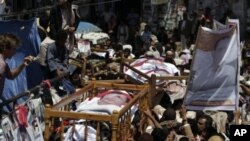Yemen's President Ali Abdullah Saleh says he is committed to a peaceful transfer of power through presidential elections. He made the comment in his first televised address Sunday, following his abrupt return from Saudi Arabia late last week after three months recuperating from an an assassination attempt.
Stating that he is committed to implementing a transfer of power initiative drafted by the Gulf Cooperation Council, President Saleh stopped short of agreeing to sign the plan. He repeated a previous offer of dialogue with his opponents, followed by early presidential and parliamentary elections.
Mr. Saleh said everyone is moving toward dialogue, understanding and a peaceful transition of power via the ballot box. But he said any elections must include presidential, parliamentary and local balloting, and that if all sides agree in principle, he would comply with the Gulf Cooperation Council initiative.
President Saleh criticized his opponents, saying that they had led the country to what he called a "grave" political crisis and that many acts of “terrorism” had been committed.
Mr. Saleh called the crisis massive, saying it requires that Yemen's leaders learn from the demonstrations in recent months that resulted in scores of people dead and wounded.
Yemen's president thanked the United States and Saudi Arabia for helping his country in the fight against terrorism. And he thanked the United Arab Emirates for providing fuel to Yemen.
In a loud tone, Mr. Saleh criticized his opponents for encouraging chaos, arguing that Yemen's constitution allows peaceful demonstrations, but not what he called the destruction of state property and robbery.
Mohammed al Qadhi, who teaches at the University of Sana'a, says Mr. Saleh's speech offered no new initiatives and left many people discouraged. “It is disappointing. People were wishful and hopeful that he would [make] a very important and historical speech to put an end to this escalating violence. But he didn't say anything new in his speech," he said.
President Saleh's speech came only hours after Yemeni troops opened fire on a large group of anti-government protesters in Sana'a, wounding at least 17 people, with reports of at least one protester killed.
Yemeni President Calls for Power Transfer Through Elections




